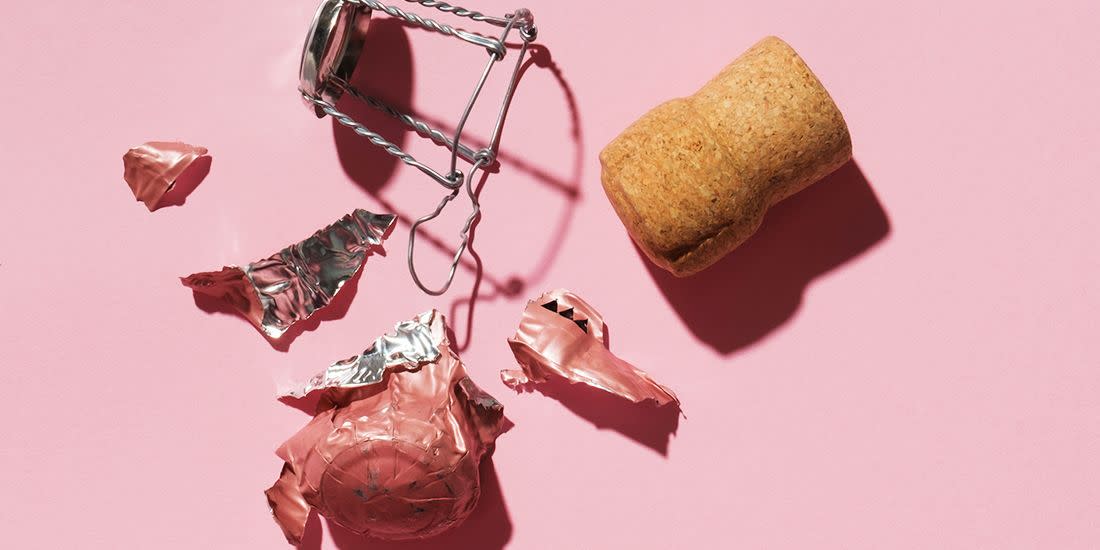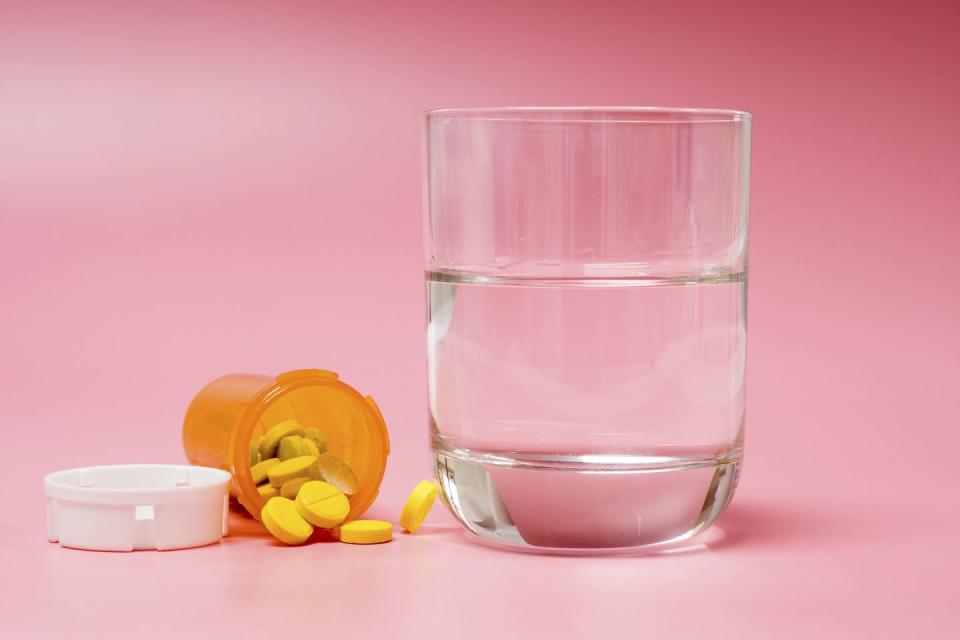If You've Ever Felt Anxious After Having One Too Many Drinks, You're Not Alone

Anyone who has had one too many drinks knows the unpleasant after effects you can feel when you wake up the next morning: a pounding headache, a queasy stomach, dizziness, a dry mouth. But for some, when it comes to the symptoms of a hangover, these common physical ailments can also be accompanied by an overwhelming feeling of anxiety. The phenomenon, in fact, is so typical that it's even been given its own name: "hangxiety," or hangover anxiety. But what exactly causes hangxiety, and can anything from your hangover kit help?
To find out more about the anxiety you might experience after a night of drinking, we talked to several psychology and medical experts about the effects of alcohol on the brain and body, and how these effects can contribute to debilitating anxiety symptoms. Though they tell us that hangxiety is a relatively common phenomenon, the good news is that there are steps you can take in order to manage it. Here's how to deal with hangover anxiety when it happens next.
What causes hangover anxiety?
Alcohol has many complicated effects on the brain and body, but the most important thing to know is that it is a depressant — which means that it dampens our flight-or-fight mechanisms as well as our stress mechanisms, some of which are mediated by a core structure in our brain called the amygdala. This means that when the dampening effects of alcohol subside, it's common to experience something that's akin to a "mini withdrawal syndrome," according to George Koob, Ph.D., director of the National Institute on Alcohol Abuse and Alcoholism (NIAAA).
"When the alcohol wears off, that system comes back with a kind of vengeance — so there's always some kind of rebound," Dr. Koob explains. "And so 'hangxiety' is basically a rebound anxiety from the suppression in anxiety or stress that the alcohol caused during this acute action."
In other words, a hangover is the result of experiencing alcohol withdrawal, and anxiety can be one of the many withdrawal effects you experience, along with typical physical symptoms such as headaches, fatigue and nausea. When it comes to feelings of anxiety specifically, think of it as your brain becoming re-activated after a drug suppressing your neuron activity wears off, says psychiatrist Mark Rego, M.D. "Because you took this depressant, you now have a small dose of withdrawal — and your brain becomes a little activated, so you'll feel anxious," he explains.
How is "hangxiety" different from general anxiety?
While the anxiety you experience during a hangover can feel like general day-to-day anxiety, hangover anxiety is only related to the effects of alcohol and may be transient, says Sanam Hafeez, Psy.D., a New York City-based clinical psychologist. So while those who are already struggling with an anxiety disorder can certainly be more likely to experience feelings of anxiety after drinking, experiencing hangxiety does not necessarily mean you have an anxiety disorder.
"[During a hangover] people experience feelings that mimic anxiety such as faster heartbeat, palpitations, sweaty palms and dizziness, which in turn can induce anxiety, even panic attacks," explains Dr. Hafeez. "And given the impaired sleep with alcohol, anxiety is further exacerbated, as sleep fosters clearer thinking, rational behaviors, and improved memory and attention — all of which when impeded contribute to anxiety as well."

How to manage hangover anxiety
Experts assure us that there are steps you can take to avoid suffering from anxiety after a night of drinking. Here's how you can manage — or even prevent — hangxiety.
1. Limit your alcohol intake.
The most obvious answer to avoid hangxiety — and hangovers in general, for that matter — is to avoid drinking altogether. If you don't want to completely cut alcohol out, though, limiting your alcohol intake is the next best option. Though it's important to be aware of your own personal tolerance (which can vary due to various factors like weight, genetics and more), Dr. Koob generally recommends limiting your alcohol intake in accordance to the dietary guidelines as advised by the CDC, which is up to one drink per day for women and two drinks per day for men.
2. Hydrate and eat.
If you are planning to drink more than the recommended amount, however, it's important to practice smart drinking behaviors like hydrating and eating plenty of food. Since alcohol is a diuretic (meaning it pulls water out of your system), it has dehydrating effects on the body that leads to symptoms like headache, dizziness and dry mouth. "The dehydrating effects of alcohol can make [your hangxiety] worse, and having a headache or other symptoms certainly doesn't help," says Dr. Koob.
To help reduce the potential effects of alcohol-induced dehydration, Dr. Koob recommends continuously hydrating before, after and in between drinks, as well as making sure to get something in your stomach before drinking (which, yes, also means never drinking on an empty stomach!).
3. Take some medicine.
Along with consuming plenty of water and food while drinking alcohol, OTC medicine can also help reduce any unpleasant hangover effects, which in turn might help ease feelings of anxiety. Specifically, Dr. Rego recommends taking an anti-inflammatory pill, like aspirin, with one or two glasses of water before going to sleep. "Most people that do that will wake up and they won't feel quite as bad because they'll be a little more hydrated and the anti-inflammatory pill calms down some of the discomfort you have," he explains.
4. Exercise and meditate.
Another great way to manage anxious feelings after a night of drinking is to engage in exercise, which can help get your blood moving and can ultimately produce a relaxing effect on both your body and your mind. "[Exercise] is a great help for most mental disorders, including anxiety — whether it's anxiety from an inherent disorder or whether it has to do with something provoked by alcohol," says Dr. Koob. When it comes to dealing with hangxiety in particular, Dr. Rego especially recommends activities that are directed at calming anxiety such as yoga, or even meditation and breathing exercises, which can be particularly helpful for managing anxiety symptoms.
5. Seek professional help.
It's important to reiterate that experiencing hangxiety does not necessarily mean you have an anxiety disorder or an alcohol use disorder. That being said, if you are continuing to experience feelings of anxiety or other symptoms, even well after you've had a few drinks, it could be a sign of a bigger or more serious problem. Specifically, if your "hangxiety" is persistent or if it's interfering with your ability to function in major areas of your life — like your job or your personal relationships — it might be time to seek professional help from a therapist, psychologist or other mental health professional, says Dr. Koob.
Similarly, if you find that you're using alcohol to self-medicate — or even turning to drinking more as a way to assuage your hangxiety, which can create a vicious cycle — it might be worth re-evaluating your relationship with alcohol. "If you feel you are drinking more than a couple of times a week, sleeping in past morning meetings, or feel fatigued or foggy all day, then it is likely due to the lingering effects of alcohol," says Dr. Hafeez. "So an early referral to a mental health specialist, or even your primary care doctor, might go a long way."
The COVID-19 crisis has made life more challenging for everyone — especially those who are struggling with anxiety. Visit NAMI’s COVID-19 Resource and Information Guide for additional advice. For more info on anxiety, visit the Anxiety and Depression Association of America.
You Might Also Like


